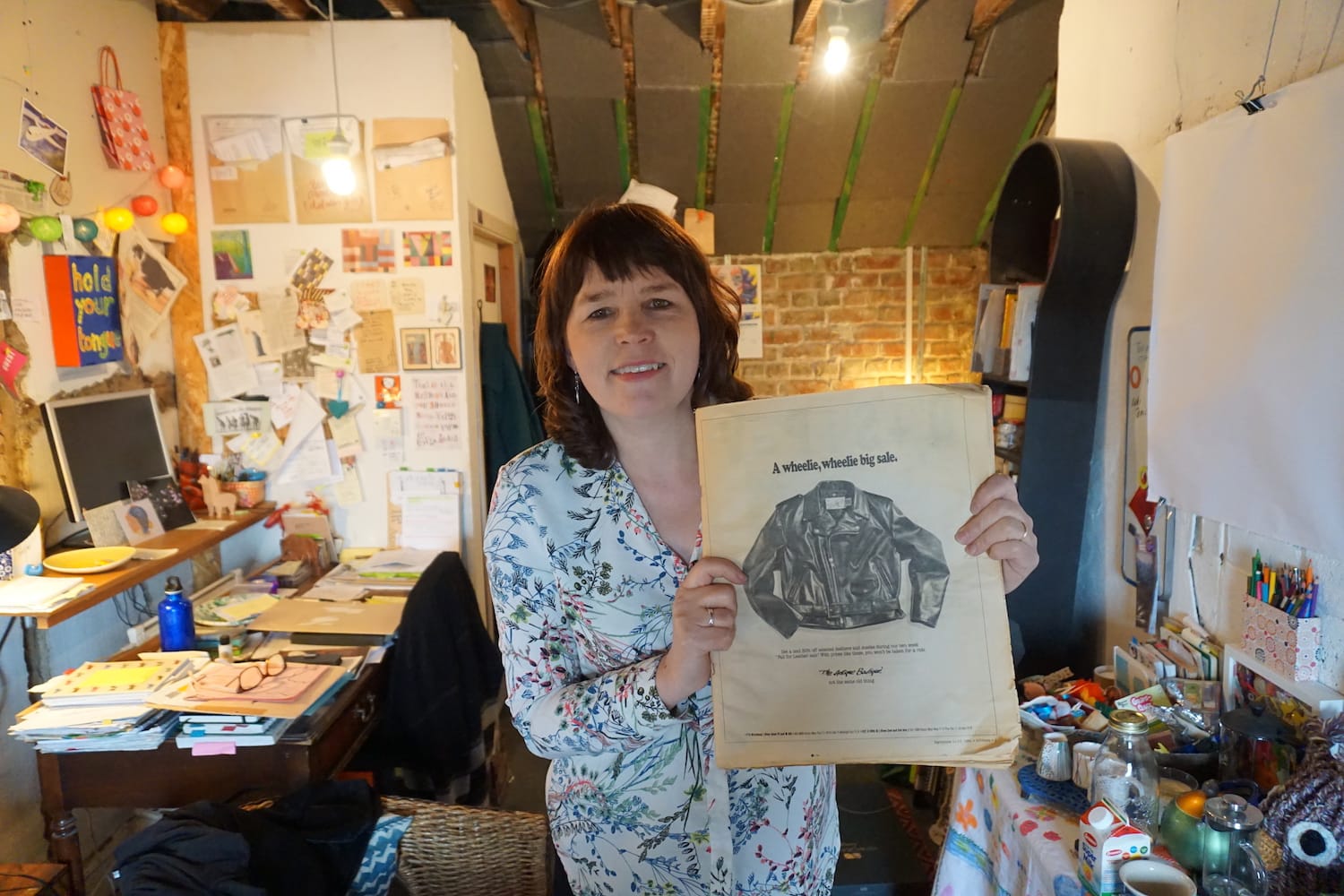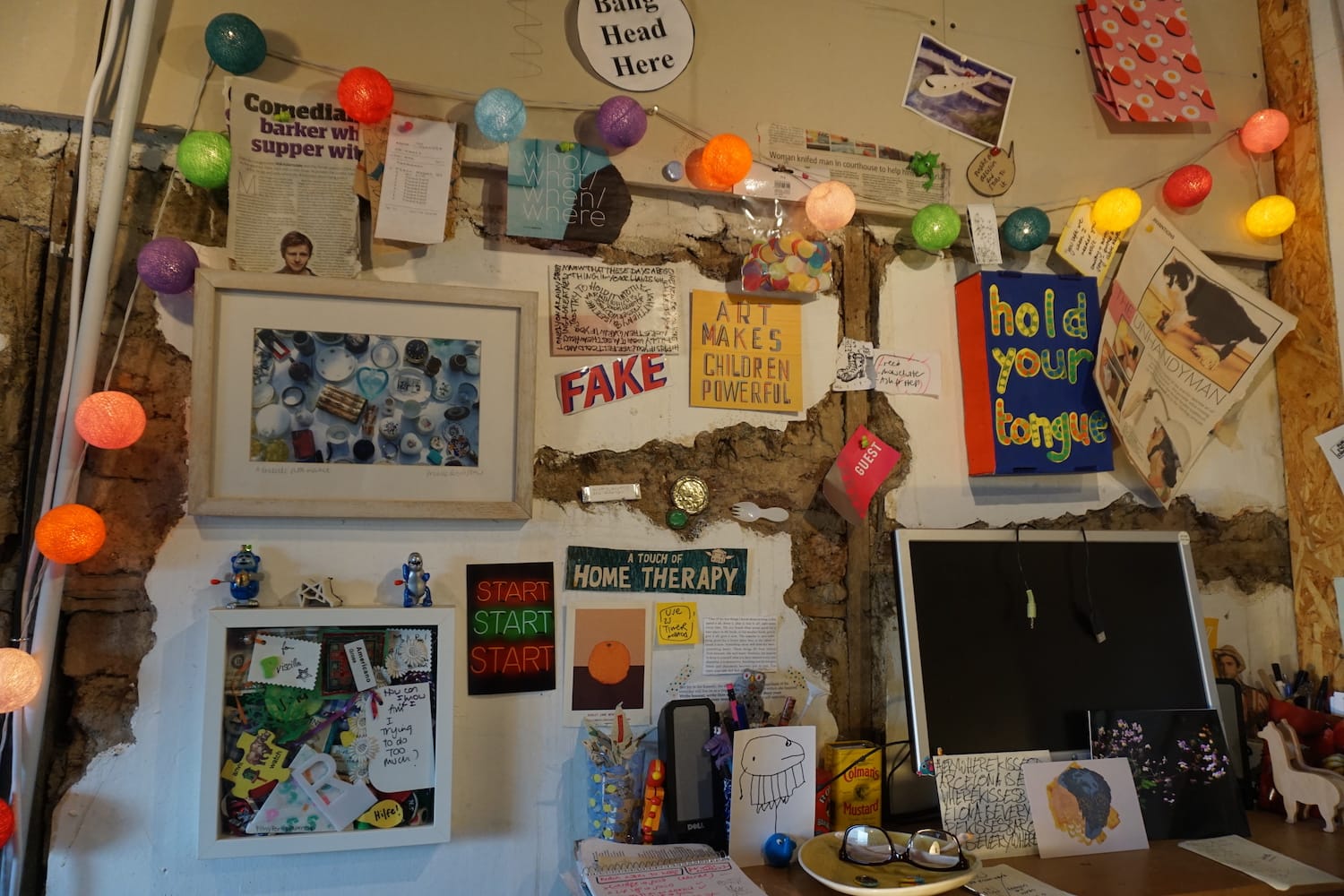What’s the best way to tell area residents about plans for a new asylum shelter nearby?
The government should tell communities directly about plans for new asylum shelters, some activists and politicians say.
She’s inviting people to her studio at the Mart Fire Station in Rathmines, which is crammed with things she hasn’t been able to part with. “It’s like a form of therapy.”

Priscilla Robinson is holding a small plastic specimen jar with a collection of black threads inside.
Her mother had a back operation in 1980, when Robinson was 11 or 12.
“I was very attached to my mother. And we were going through a hard time as a family, and then my mother had to have a back operation at the same time. So everything was very difficult,” she says.
The threads are the stitches that came out of her mother’s back. “I thought it would be cool to keep,” she says.
The jar of stitches is one of the 50 things Robinson – a writer, performer, and comedian – thinks she’ll probably still own when she dies.
She keeps them, and many other things, in her attic studio at the Mart Fire Station Gallery & Studios in Rathmines. Later this week, she plans to invite people in to take a look at the things, and, maybe, help her declutter.
Robinson can’t remember exactly when she realised she had a lot of stuff. She’d lived in the same flat on Pearse Street for 14 years and didn’t have a pressing reason to purge.
“I remember, once, this hairdresser came to cut my hair in the house, and she just went, ‘Wow, you’ve got a lot of stuff.’ And I thought, ‘Why is the hairdresser commenting on my stuff? That’s strange.’”
In 2015, she had to move out of her flat, but she didn’t have time to go through things first. So she moved a lot of them to her mother’s house.
Since then, she’s moved six times and done boot sales and flea markets, trying to thin things out.
“I’m very aware what I own now, living in a small place, which is a good thing in a way, because there’s not many places to hide things. I try very hard to find places to hide things, but it’s quite difficult,” she says.
“So, hence, I still have a lot of things at my mother’s, and she’s in her 80s.”
When Robinson first moved, her mother Helen bought a garden shed for the extra stuff. But Robinson also keeps things in her mother’s garage, attic, bedroom, and two spare rooms.
Helen, her mother, is not a collector. “I could get rid of a DVD I’d only watched half of,” she says.
“I’m 88 and moving on sometime, so I can put my belongings into a few spaces, whereas she has spread out over the house,” she says.
It doesn’t bother her that much, she says. “But sometimes I think after my funeral, her siblings will say, ‘Come on, get rid of that stuff.’”
Helen used to work as a bereavement counsellor. She had to write a lot and prepare talks. She says she understands why her daughter would want to save the things she writes.
“If you’re creative, an artist, it’s a bit like giving away some of your heart’s blood. It’s quite a hard thing to do,” Helen says.
“I’d still keep a few shreds of my notes on my talks on grief [that my children] might read after my funeral. I think Priscilla would be the one who would read them.”
Helen never knew her daughter saved the stitches from that back surgery decades ago, but she says she gets it.
“We went through a difficult time as a family then, and she was probably affected very much. She was quite the rock,” Helen says.
“It was more than stitches out of my back. It’s saying something quite deep … I made a pretty good recovery, but I don’t think, well, none of our hearts ever recovered.”
Robinson kept a yellowed newspaper she brought back from a trip to New York in 1991 – it’s missing its front page.

She has articles from when Kurt Cobain died, articles about 9/11, and articles about good cycle routes to do in Ireland.
Robinson is walking around her studio, rummaging in boxes and baskets and plastic folders.
She pulls out a smallish black box she kept as a kid. She roots around in it.
“Things people gave me, like a guitar string. I can’t remember who gave it to me. That’s funny, isn’t it? You forget how things are significant, but you know they are.”
Robinson goes to the corner of the studio and pulls out a box full of books.
“These are school projects I did, and they’re all on really boring topics, like litter and home insulation and fire. Great reformers of the 18th century,” she says.
Now she’s flipping through a different book.
“When I was a kid, I kept every card I ever got and put it in a scrapbook. That’s really sad, isn’t it?”
She thumps it down onto the floor.
Robinson sometimes goes through an exhausting mental process before she decides to get rid of things. Take her college notes, for example.
“Do you go through them all? Do you read them all? Do you keep them for another 10 years? Or do you get rid of them? Or do you keep a sample? How many options do you have? What else could you do with them?”
That’s the dilemma Robinson has with all of her written things – she’s afraid to throw them out in case there’s something good in them.
Robinson’s mother thinks she just moves things around.
“She’ll say, ‘I’m coming up to declutter.’ But decluttering means moving stuff from bedroom to attic, garden shed to garage, room to studio,” Helen says. She wonders, sometimes, why Robinson wouldn’t just hire a skip and get some black bags.
“I don’t talk to her about that. I don’t want to burden her about it,” Helen says.
Robinson is preparing for two events. The first is the Mart Studios Open Night on Thursday 16 May, from 6pm to 8pm. Many of the working spaces will be open that night.
“I’m going to have people interact with the stuff, and I’m going to have something written on the wall. It won’t be very structured,” she says.
And on Saturday 18 May, Robinson plans to hold a live decluttering event at her studio at Mart, from 1pm to 6pm. She only has space for a few people at a time, so pre-booking is a must.
She plans to examine her difficulty with letting things go through discussion, games and Swedish Death Cleaning. Her mother will be there, as will her friend Veronica Dyas, a theatre-maker who got rid of all her belongings.
“It’s like the Marie Kondo book. She says you need to do this on your own … But that’s kind of why I want to bring people in, because I think it’s very hard doing it all on your own,” she says.
Robinson says she’d like for people to “maybe try and persuade” her to get rid of some things.
“It’s like a form of therapy,” she says.

Get our latest headlines in one of them, and recommendations for things to do in Dublin in the other.